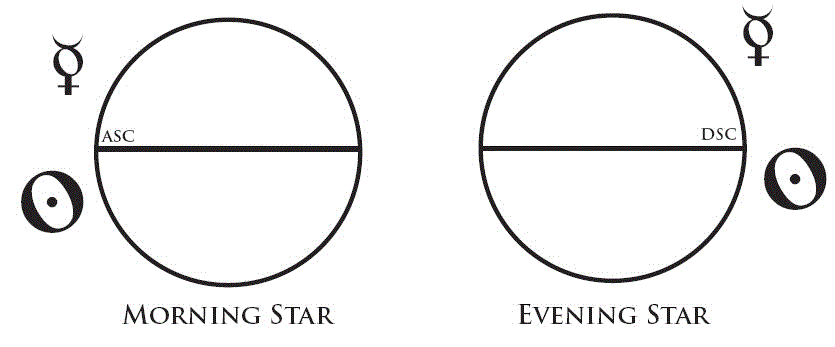Benefic/Malefic Planets
Insofar as they are benefic or malefic, where good tends to mean abundance, endurance, and growth, and bad means scarcity, destruction, and limit.
Generally:
• Malefic: Saturn, Mars
• Benefic: Jupiter, Sun, Venus
• Depends: Mercury, Moon
Mercury's effect depends on the planets he is in conjunction or aspect with.
The moon is generally benefic when waxing to full, and malefic when waning to new.
Relation to the Sun
Orientaly/Occidentaly
Interpretation: Oriental plaets are fortificd, more efficient, and seem to express themselves m socially acceptable, praiseworthy, moderate, and benefic ways; they will have more remarkable and straightforward effects." Occidental planets have a more difficult time, and display the opposite characteristics. How to interpret the planets depends largely on the topic at hand: in judgmg the temperament of a native, orientality occidentality can mfluence the primitive qualities of the planets

Cazimi
Cazimi (0°0’ - 0°16’ from the Sun)
A planet in cazimi is greatly strengthened. According to Ibn Ezra, a planet in cazimi is like
“a person sitting with the king in one chair.”Cazimi, then, leads to the most enchanted state wherein the essential meaning of the planet becomes truly inseparable from our spirit. If the planet is in superior conjunction with the Sun (on its far side) then the effect will be stronger, because superior conjunctions represent a ‘Full Moon’ stage of the planetary cycle.
Combustion
Combustion (16’ – 7.5° from the Sun)
According to Ibn Ezra, a combust planet is like “a dying person.”
Zoller explains further that the Sun usually burns up and blots out the expected effect of a combust planet, but that the Sun can sometimes absorb the signification of the combust planet (i.e., it will still be effective, but through the Sun). At present, my belief is that a Sun in great dignity (e.g., in domicile or exaltation) can absorb and produce that planet’s effects in a beneficial way, rather than stamping them out. Combust planets are unorthodox and often willfully defy external direction because they are confident in their own inner unique grasp of the planet's essential meaning. They are either aloof from or disinterested in the material agenda of the planet concerned but will still display its power radiantly and forcefully but somewhat enigmatically and individually.
Abu Ma’shar says some planets can bear combustion pretty well, others not:
• Saturn: like an old shabby man unable to bear pains, sorrows, and punishments.
• Jupiter: like a man put to the test, able to bear pains and sorrows, since he hopes to take advantage of them.
• Mars: like a very wicked man whose wickedness and offense increase.
• Venus: absolutely weak and without strength; unable to bear combustion.
• Mercury: like a man accustomed to difficulties and misery and poverty, but is able to bear them because they are familiar.
Under the Sunbeams,
Cazimi
Under the Sunbeams” (7.5 - 15° from the Sun)
Again, being under the sunbeams is effective even if the planet is in a sign different from the Sun’s. According to Ibn Ezra, “A planet under the light of the sun is like a person in prison” and “has no strength.”Under the sunbeams a planet is warmed and vitalized and somewhat or completely invisible, meaning it is commanding and infused with our inner light but somehow ‘on the fringes’, lacking in conventional status. It becomes ethereal, alluring, unusual, and dreamy.
Abu Ma’shar says the following about what planets are like when they are beginning to emerge from out of the sunbeams:
• Saturn is like a lion which throws itself out of its den and kills whomever it meets.
• Jupiter is like a man who loves justice, is honest and got free from his bonds, and so is mild, well-disposed toward everything, kind and merciful.
• Mars is like a sharp and infallible blade and the wound it causes is incurable.
• Venus is like a woman who, subject to needs and torment and disease, recovers health.
• Mercury means a good thing if near or configured with a benevolent star
(planet); but if conjunct a malevolent one, a very serious offense.
Abu Ma’shar says (II.179) it is like a heated stone that decays and breaks. It seems to me this means Mars does not bear combustion well, as he does worse.
Mercury is often combust because he never strays more than 28° from the Sun.
Motion and Speed
When a planet is direct, moving in zodiacal order, that planet will be dignified by four points. However, this rule does not apply to the Sun or the Moon, as these luminaries are always direct. However, if a planet is in retrograde motion, in reverse zodiacal order, then it will be debilitated by five points.
When a planet is “swift in motion”, moving faster than its daily mean motion, it is considered to be dignified by two points, but when a planet is moving slower than its daily mean motion, it is said to be debilitated by two points.
Fixed Stars
In the last subsection of the table, Lilly points out benefic and malefic fixed stars that can either dignify or debilitate a planet. If a planet is conjunct the Fixed Stars Regulus, now at 0º Virgo, then it will have the most accidental dignity in the entire table, being dignified by six points. If a planet is conjunct Spica, now at 24º of Libra, then these planets are considered to be incredibly dignified, by five points. These fixed stars give a planet such strength because of the benefic nature these fixed stars have. However, if a planet is conjunct the Fixed Star Caput Algol, 26º of Taurus, then it is considered to be heavily debilitated by five points, due to the malefic nature of this fixed star.